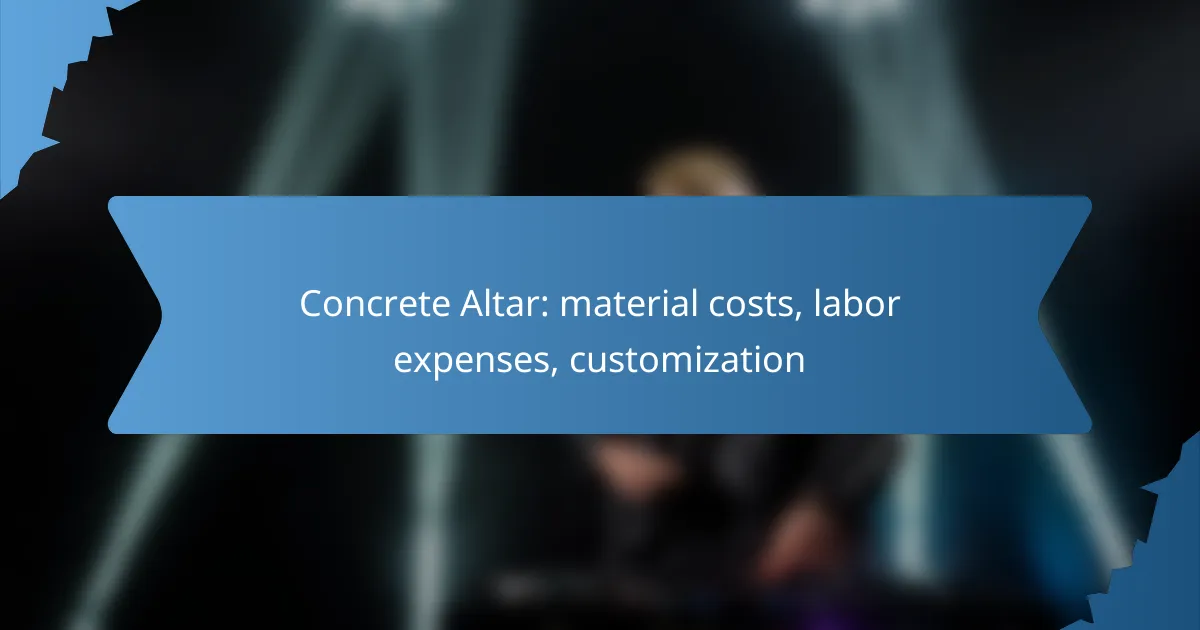Concrete altars offer a versatile option for both personal and ceremonial use, with material costs typically ranging from several hundred to a few thousand dollars based on size and design complexity. Labor expenses for installation can vary widely, influenced by location and project intricacies. Customization options, including design elements and finishes, allow for a unique altar that reflects individual preferences and needs.
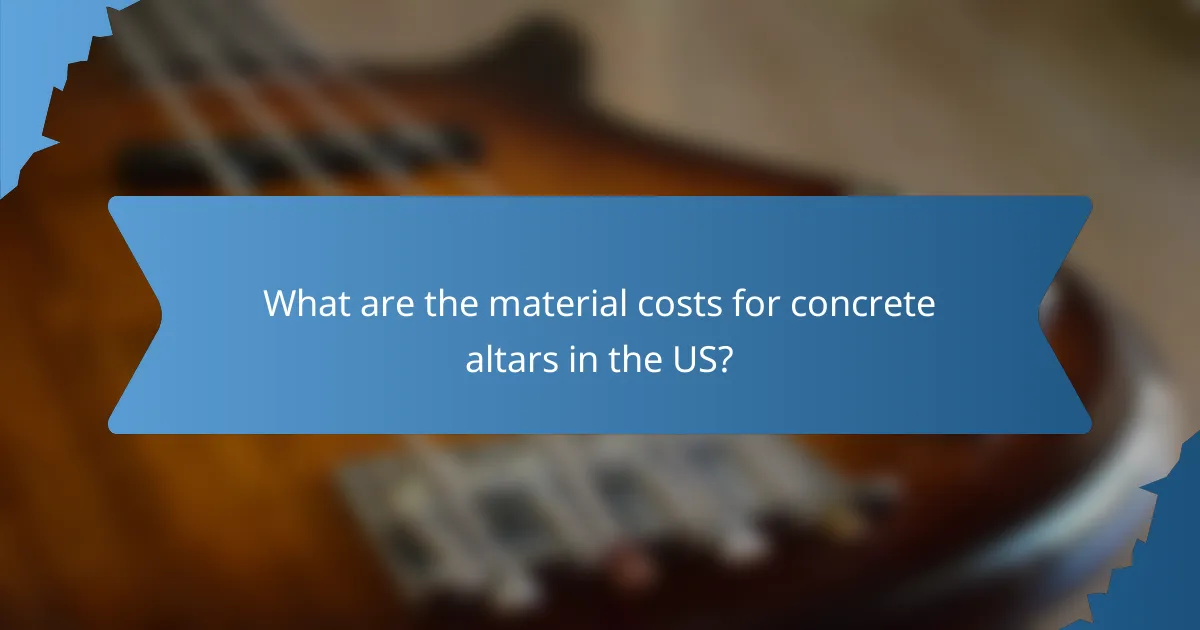
What are the material costs for concrete altars in the US?
The material costs for concrete altars in the US typically range from several hundred to a few thousand dollars, depending on the size and design complexity. Key factors influencing these costs include the type of concrete used, local market prices, and any additional materials required for customization.
Average cost per cubic yard
The average cost for concrete in the US is generally between $100 and $150 per cubic yard. This price can vary based on the concrete mix, with specialty mixes potentially costing more. For a standard altar, you might need several cubic yards, so it’s essential to calculate the total volume required for your specific design.
Price variations by region
Material costs for concrete altars can differ significantly across the US. For instance, prices in urban areas may be higher due to increased demand and transportation costs, while rural regions might offer lower prices. Generally, expect to pay around 10-20% more in states with higher living costs, such as California or New York.
Factors affecting material costs
Several factors can influence the material costs of concrete altars. The type of concrete mix, such as standard, high-strength, or decorative, can lead to price variations. Additionally, local supply and demand dynamics, as well as the distance from suppliers, can impact overall costs.
Customization options, such as color, texture, and embedded designs, also affect the final price. It’s advisable to consult with local suppliers to get accurate estimates based on your specific altar requirements and preferences.
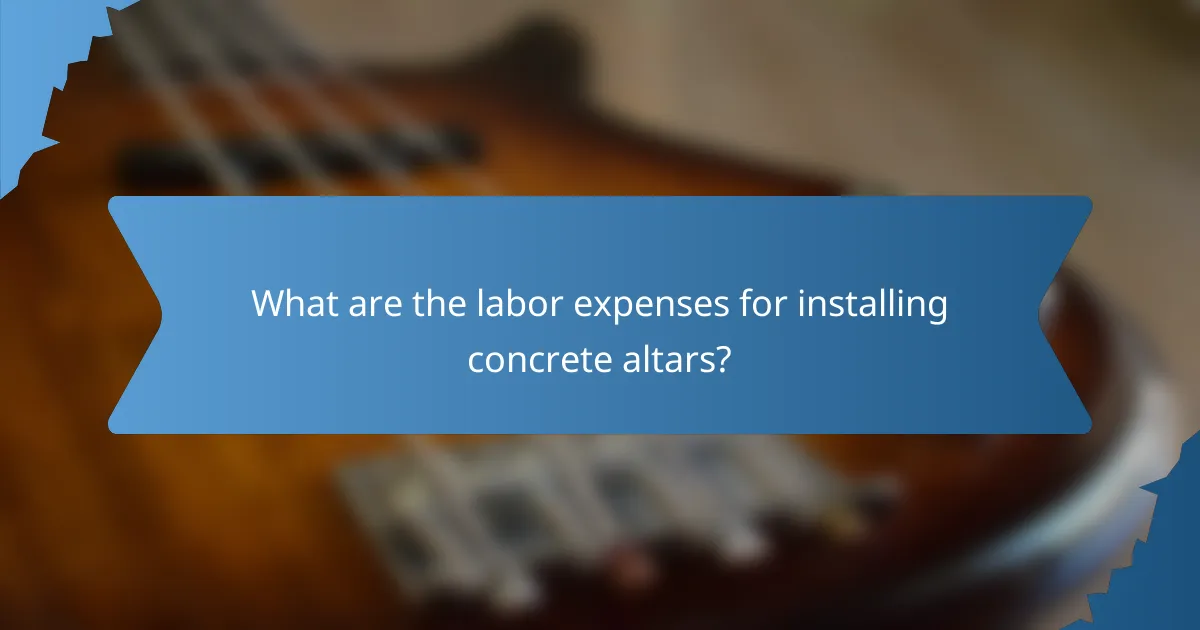
What are the labor expenses for installing concrete altars?
Labor expenses for installing concrete altars can vary significantly based on factors such as location, complexity of the project, and the experience of the workers. Generally, these costs encompass both the hourly rates of labor and the total time required for installation.
Typical hourly rates for labor
Hourly rates for labor involved in installing concrete altars typically range from $20 to $50 per hour in the United States. Skilled workers, such as concrete masons, may charge higher rates, often between $40 and $70 per hour, depending on their expertise and the project’s demands.
In Europe, rates can vary widely, with countries like Germany and France seeing rates from €25 to €60 per hour, while Eastern European countries may offer lower rates, often between €15 and €30 per hour.
Labor costs by region
Labor costs for installing concrete altars differ significantly across regions. In urban areas, where demand for skilled labor is higher, costs may be at the upper end of the scale. For example, in cities like New York or San Francisco, total labor expenses can exceed $70 per hour.
Conversely, rural areas tend to have lower labor costs, often falling below $30 per hour. It’s essential to consider local market conditions when budgeting for installation.
Time estimates for installation
The time required to install a concrete altar can vary based on size and complexity. A simple altar may take a day or two to install, while more elaborate designs could require several days or even weeks. Factors such as curing time for the concrete also play a role in the overall timeline.
As a general guideline, plan for at least 8 to 16 hours of labor for a standard installation, but be prepared for additional time if customization or intricate designs are involved. Always consult with your contractor for a more accurate estimate based on your specific project needs.
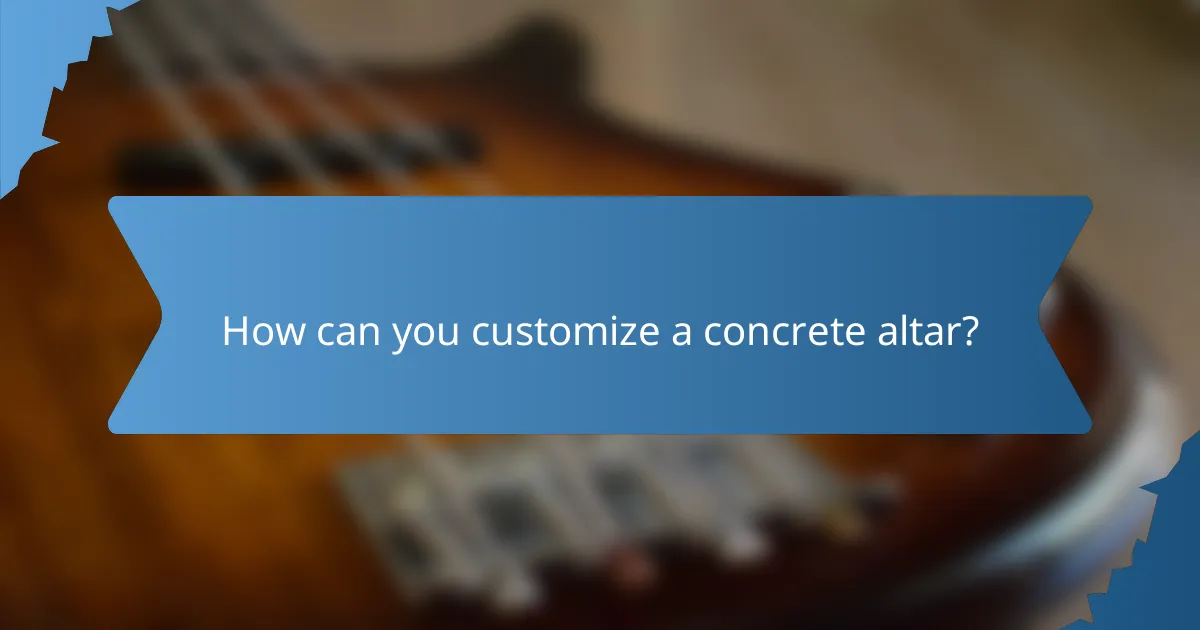
How can you customize a concrete altar?
Customizing a concrete altar involves selecting specific design elements, finishes, and dimensions to create a unique piece that meets personal or ceremonial needs. Options range from decorative engravings to varied color finishes, allowing for a tailored aesthetic that reflects individual preferences.
Common customization options
Common customization options for concrete altars include size adjustments, surface textures, and decorative elements. For instance, you can choose a polished finish for a sleek look or a rough texture for a more rustic appearance. Additionally, incorporating symbols or inscriptions can personalize the altar further.
Color choices are also significant; while standard gray is typical, you can opt for stained or dyed concrete in various hues to match the surrounding environment or theme. Some may even choose to integrate materials like wood or metal for added contrast.
Cost implications of customization
The cost of customizing a concrete altar can vary widely based on the complexity of the design and materials used. Basic customization, such as size adjustments, may add a few hundred dollars, while intricate designs or high-quality finishes can increase costs significantly, potentially reaching into the low thousands.
It’s essential to budget for both materials and labor when considering customization. Custom designs often require skilled artisans, which can elevate labor expenses. Always obtain multiple quotes to ensure a fair price for the desired level of customization.
Examples of unique designs
Unique designs for concrete altars can include features like embedded glass or stone, which create visual interest and enhance the altar’s significance. For example, an altar with a mosaic pattern made from colored glass pieces can serve as a stunning focal point.
Another example is a multi-tiered altar, which allows for different levels of offerings or decorations. Additionally, some may opt for a circular altar design, promoting a sense of unity and inclusivity during ceremonies. Each of these designs can be tailored to fit specific spiritual or aesthetic needs.
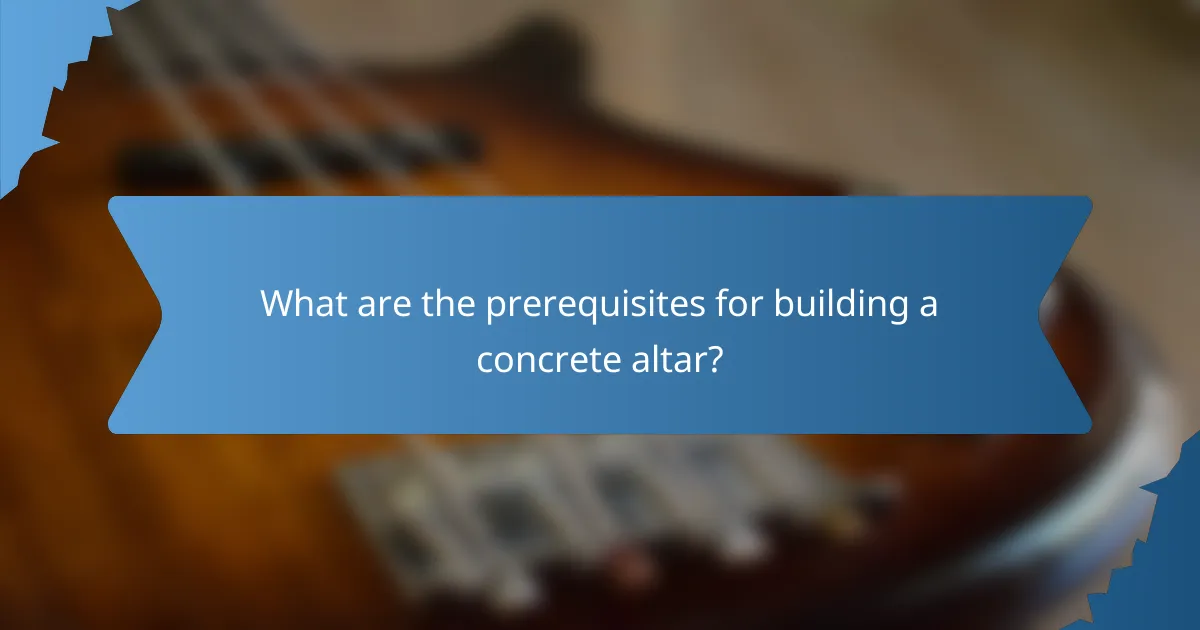
What are the prerequisites for building a concrete altar?
Building a concrete altar requires careful planning, including site preparation, obtaining necessary permits, and adhering to local regulations. Understanding these prerequisites ensures a successful construction process and helps avoid legal issues.
Site preparation requirements
Site preparation is crucial for a stable concrete altar. Begin by selecting a level area that is easily accessible and free from obstructions. Clear the site of vegetation, debris, and any existing structures that may interfere with construction.
Next, consider the foundation. A solid base, often consisting of compacted gravel or crushed stone, is essential to support the weight of the altar. Depending on the size, you may need to excavate a few inches to create a proper footing.
Permits and regulations
Before construction, check local building codes and zoning regulations to determine if a permit is required for your concrete altar. Many municipalities have specific guidelines regarding the size and placement of outdoor structures, especially in residential areas.
Failure to obtain the necessary permits can result in fines or the requirement to dismantle the altar. Contact your local planning office for detailed information on the application process and any associated fees, which can vary widely based on location.
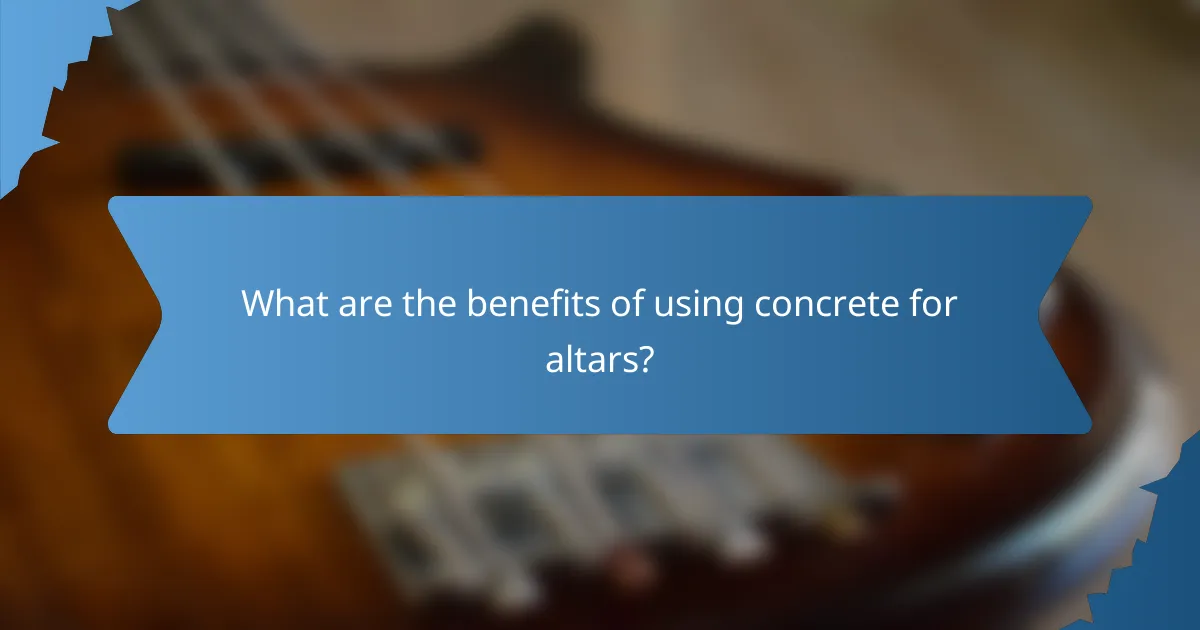
What are the benefits of using concrete for altars?
Concrete altars offer significant advantages, including durability and design flexibility. These benefits make them a popular choice for both religious and ceremonial settings.
Durability and longevity
Concrete is renowned for its strength and resilience, making it an ideal material for altars that need to withstand the elements. Unlike wood or other materials, concrete does not warp, rot, or succumb to pests, ensuring that the altar remains intact for many years.
In terms of maintenance, concrete requires minimal upkeep. Regular cleaning and occasional sealing can keep it looking fresh, while its inherent properties protect it from weather-related damage. This longevity can save costs over time, as replacements are less frequent.
Design versatility
Concrete allows for a wide range of design options, accommodating various styles and preferences. It can be molded into intricate shapes, textured finishes, or painted to match specific themes, making it suitable for diverse religious or ceremonial contexts.
Customization is straightforward with concrete; artisans can incorporate symbols, inscriptions, or unique features that reflect the intended use or cultural significance. This flexibility ensures that each altar can be tailored to meet specific aesthetic and functional requirements.
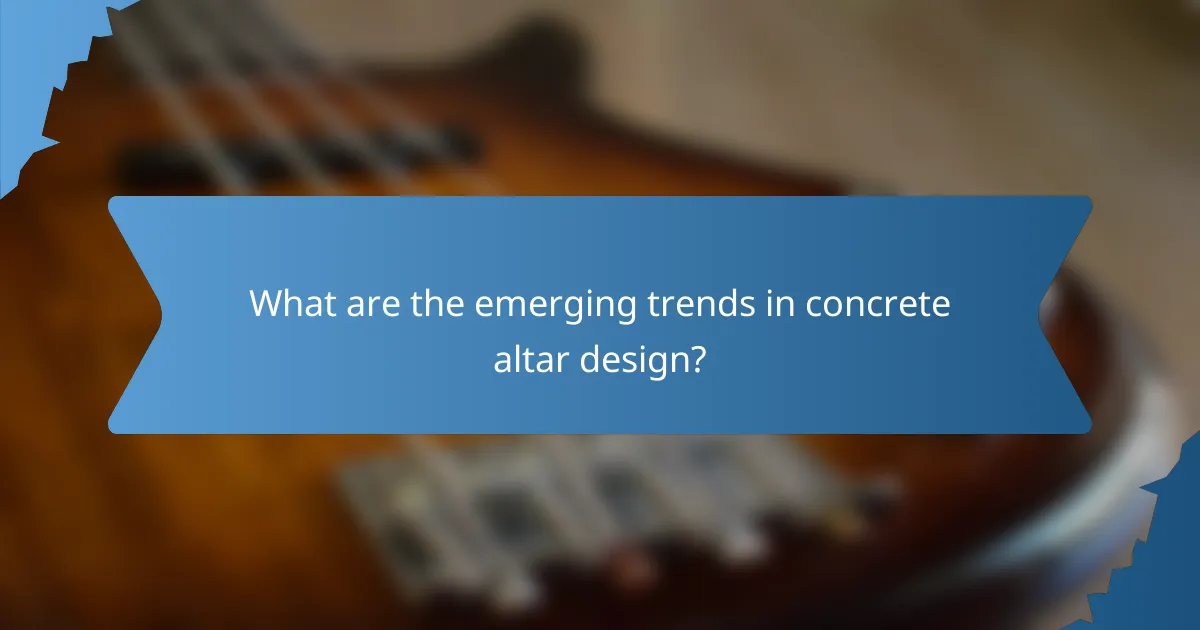
What are the emerging trends in concrete altar design?
Emerging trends in concrete altar design focus on sustainability, customization, and integration with natural elements. Designers are increasingly using eco-friendly materials and innovative techniques to create unique, personalized altars that reflect individual beliefs and aesthetics.
Material costs
Material costs for concrete altars can vary significantly based on the type of concrete used and any additional finishes or treatments. Basic concrete may cost around $100 to $200 per cubic meter, while decorative options like stamped or stained concrete can increase costs to $300 or more per cubic meter.
When budgeting, consider additional materials such as reinforcement bars, sealants, and any decorative elements. These can add another $50 to $150 depending on the complexity of the design.
Labor expenses
Labor expenses for constructing a concrete altar typically range from $50 to $100 per hour, depending on the region and the complexity of the project. Skilled labor is essential for ensuring proper installation and finishing, which can affect the overall quality and durability of the altar.
It’s advisable to obtain multiple quotes from contractors to ensure competitive pricing. Be aware that labor costs may increase if the project requires specialized skills or if the site presents challenges.
Customization
Customization options for concrete altars are extensive, allowing for unique designs that reflect personal or cultural significance. Options include varying shapes, sizes, textures, and colors, which can be tailored to fit specific themes or environments.
When considering customization, think about the altar’s intended use and the surrounding landscape. Collaborating with a designer can help you explore creative possibilities while staying within budget. Keep in mind that more intricate designs may lead to higher material and labor costs.
